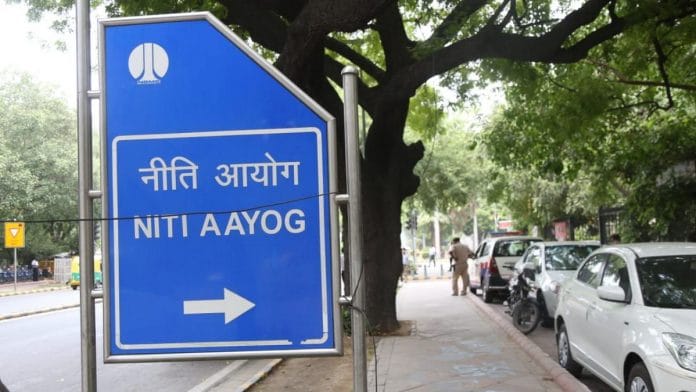New Delhi: Faster and efficient processes for obtaining permits within 45 days, granting electricity connection for commercial activity within 15 days, mandatory 90 per cent land acquisition prior to award of work or start of construction, enactment of a land titling law to reduce litigation, and improved land acquisition.
These are some of the key points in Niti Aayog’s roadmap to make India a “global manufacturing hub” and build physical infrastructure in the country, compiled after consultations with states and the Centre.
The federal think-tank held detailed consultations with states earlier this month before Prime Minister Narendra Modi chaired a final meeting with chief ministers on 20 February.
ThePrint has accessed the agenda document for the meeting, which was prepared after consultations with chief secretaries of states.
In a bid to reduce compliance at the state level to promote ease of doing business, the states and Union territories have also been advised to set up a dedicated task force to identify compliance burden in their respective ‘Champion Sectors’ to promote investment, employment, and exports. The exercise has to be completed by 15 August.
Also read: Railways to monetise assets worth Rs 54,000 cr to raise funds, has identified projects, land
Ease of doing business
According to a Niti Aayog analysis conducted across five states — Gujarat, Maharashtra, Tamil Nadu, Uttar Pradesh and Karnataka — there are 2,736, 2,920, 2,136, 2,054 and 1,980 compliances, respectively, in these states.
In its document, the think-tank noted, “Minimizing the regulatory compliance burden is one of the most crucial steps for enhancing the EoDB (ease of doing business) and can be a decisive step in the direction of making India one of the most preferred investment destinations in the world.”
For this purpose, ministries and departments have been advised to take up detailed assessment of all their Acts, rules and regulations.
“Relevance and rationale for each interface with citizens and businesses needs to be assessed and regulatory requirements, which are no longer relevant, need to be eliminated,” the document said.
All ministries and departments across the country have been advised to take up the task of rationalising compliance as a “continuous exercise”, with a focus on decriminalisation of all laws for minor civil offences, removing redundant laws and provisions, and eliminating regulatory burdens which add cost and time without tangible improvement in governance.
The initiative is expected to unfold over two phases. While the states are expected to reduce regulatory burden across licenses, certificates, renewals, inspections, registers and records, returns, filings, etc. by 31 March, decriminalisation of archaic laws is expected to be undertaken by 15 August.
Each state has been asked to identify two cities which can be developed as major business hubs by improving the quality of land administration, with the enactment of Land Titling Bill to move towards conclusive property title regime, and starting an integrated portal for digitisation and online access of land records of at least 30 years.
The states have further been asked to develop faster and efficient processes for obtaining construction permits via Online Building Permission System within 45 days. They may also develop a framework for risk-based classification and enable even faster permits for low-risk constructions, and reduce time for getting new commercial electricity connections to 15 days.
Also read: Why microborrowers in Assam are refusing to repay their loans this poll season
Boosting physical infrastructure
While the Central government has rolled out the National Infrastructure Pipeline, states continue to have a critical role in facilitating land, right of way and clearances in case of Centre- or private-led projects, the Niti Aayog document noted.
So, states have been advised to develop an efficient and bankable mechanism for bidding out large projects, which will involve acquisition of land and clearance or approvals in a Special Purpose Vehicle which can then be bid out.
Further, they have been advised to ensure the availability of at least 90 per cent of land prior to award of work or start of construction in all projects.
In a bid to prevent disagreements from metamorphosing into disputes that would thwart infrastructure projects, states have been asked to build an effective institutional infrastructure for disputes resolution at all the stages.
The steps recommended include making mandatory the appointment of an independent engineer in all infrastructure contracts to address issues that may arise during construction; establishing state-level conciliatory mechanisms of two or three conciliation committees comprising three independent experts, including a high court judge, and designate civil courts as special courts to try suits pertaining to infrastructure projects.
The Niti Aayog has also urged all states to take measures to reduce the logistics cost of business. According to the document, there is an acute shortage of truck drivers (estimated at 28-30 per cent) resulting in heavy idling of trucks and loss to the economy.
The states have been asked to promote skill upgradation, commercial literacy, highway amenities, initiate state specific schemes and access to healthcare benefits to make the profession of drivers more attractive.
All states have been advised to have their own logistics policy, a logistics coordination committee at the state as well as city level with representation from field officers from central agencies and local stakeholders, and a logistics cell to coordinate and hand-hold businesses for getting requisite approvals and clearances.
Also read: UP govt presents budget, proposes Rs 101 crore for construction of airport in Ayodhya






